It is widely known that happiness can both be a result of our circumstances or our internal state of mind. But how much of our happiness is genetic? Our new survey has found that 25% of our happiness is believed to be genetic.
A survey of 1,155 respondents found that on average, people say that 24% of our happiness is dependent on our genetics. This histogram shows the distribution of answers, with an average of 24% and a standard deviation of 13%.
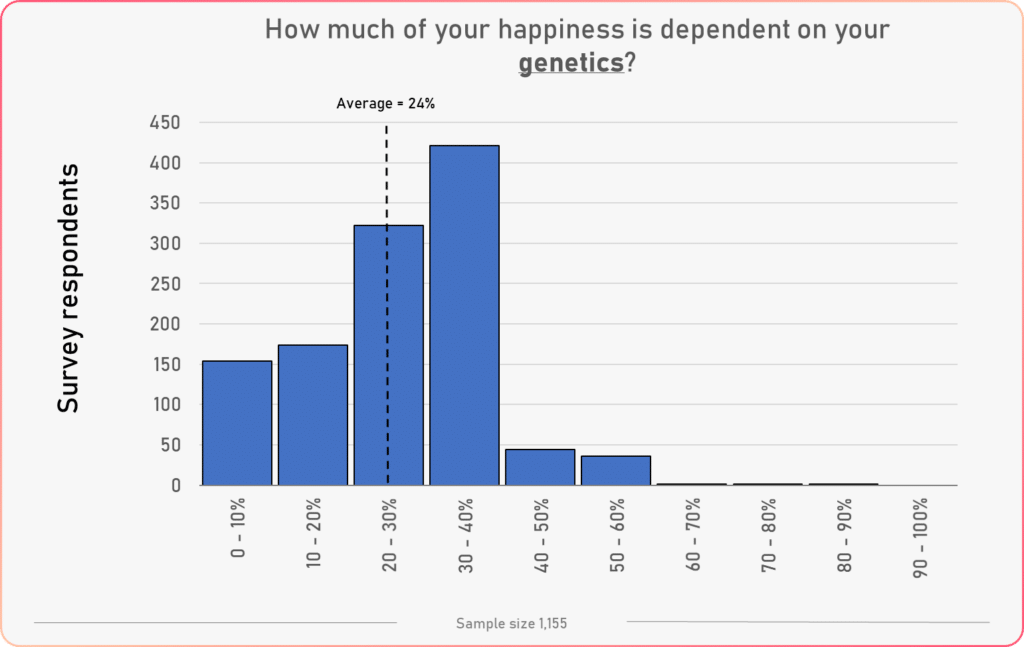
This would imply that there’s nothing that we can do about this part of our happiness.
But then, why do some people believe 0% of their happiness is genetical, whereas others believe it’s over 50%?
Our new study aims to find out why some groups of people think that happiness is more genetic than others. What can we learn from this data?
Contents
How much of our happiness is genetical?
Our survey questioned 1,155 respondents on their happiness, by asking a very specific question:
If you look back at the last year of your life, how much of your happiness was dependent on genetics, circumstances and your internal state of mind?
Each of the 1,155 respondents provided answers based on a range from 0 to 100%, with intervals of 10%.

(A footnote was added that reminded respondents that the total of all 3 factors must add to 100%. When the total didn’t match 100%, the individual factors were scaled up or down pro-rato, so that the total would match 100%.)
The 1,155 answers are presented in a histogram below:

The histogram shows the distribution of answers, with an average of 24% and a standard deviation of 13%.
This means that – on average – our respondents believe that 24% of their happiness is determined by their genetics. In other words, 24% of our happiness cannot be changed as it’s a part of who we are.
Some people are just happier than others, as a result of their genetics.
This also means that the remaining 76% of our happiness is determined by either our external circumstances or our internal state of mind, according to the respondents of our study.
What makes happiness more genetical?
With a standard deviation of 13%, we wanted to determine if there are certain factors that could reliably influence the amount of happiness that is genetic. For example, does our age influence this 24% positively or negatively?
To find out, we asked each respondent a number of additional questions, ranging from overall happiness rating to employment status. How did these affect the amount of happiness that is genetic?
Happiness rating
The happiness rating of the respondents had a significant influence on the amount of happiness they believed to be genetic.
We asked the respondents the following question about their happiness:
If you look back at the last year of your life, how would you rate your happiness on a scale from 1 to 10?
We then grouped all respondents based on their answers. Finally, we averaged the percentage of happiness that they believe is determined by their genetics.
The results are shown in this graph:
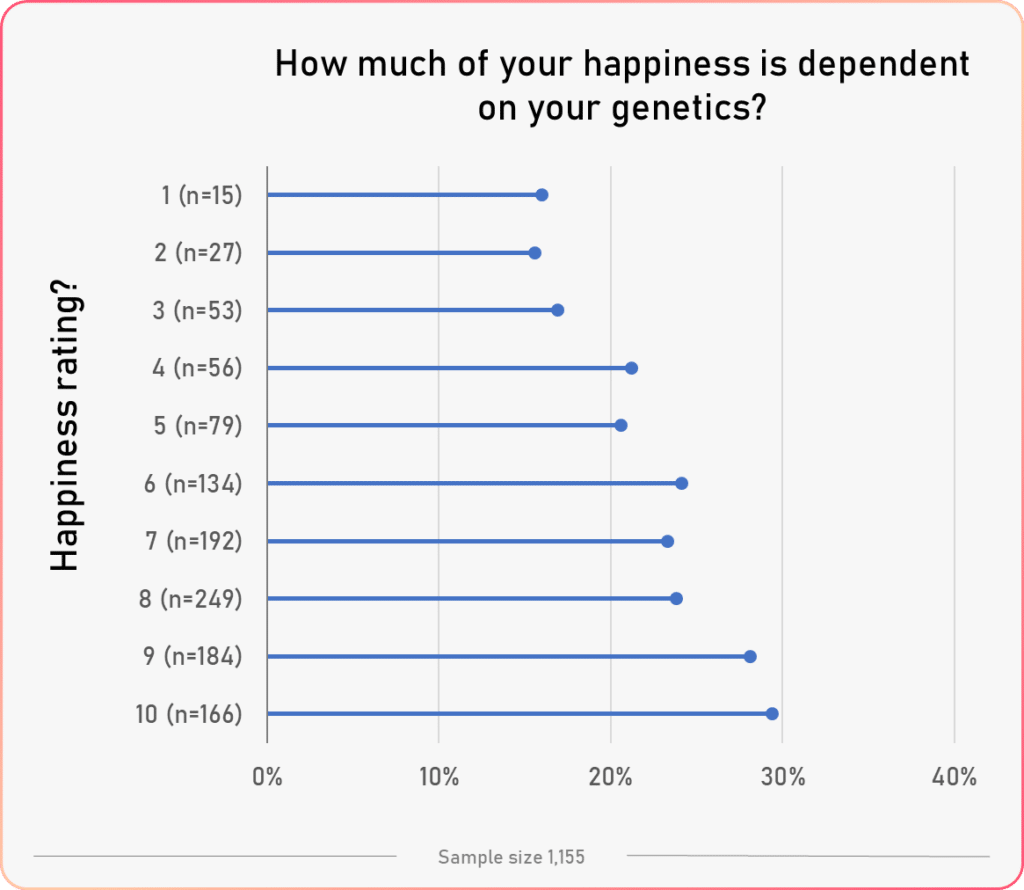
This shows a positive correlation between how happy people are and how much of that happiness they believe is a result of their genetics.
In other words, the happiest people in our dataset (happiness rating = 10) believe that 29% of their happiness is genetical. On the other hand, the unhappiest respondents (happiness rating = 1) believe that just 16% of their happiness is genetical.
Can happiness be controlled?
People who believe that happiness is controllable are counterintuitively inclined to think that a larger part of their happiness is genetical.
We asked the respondents the following question about their happiness:
Is happiness something that you can control?
130 respondents answered “No”, while 1,025 respondents answered “Yes”. For each group, we averaged the percentage that they answered.
The results are shown in this graph:
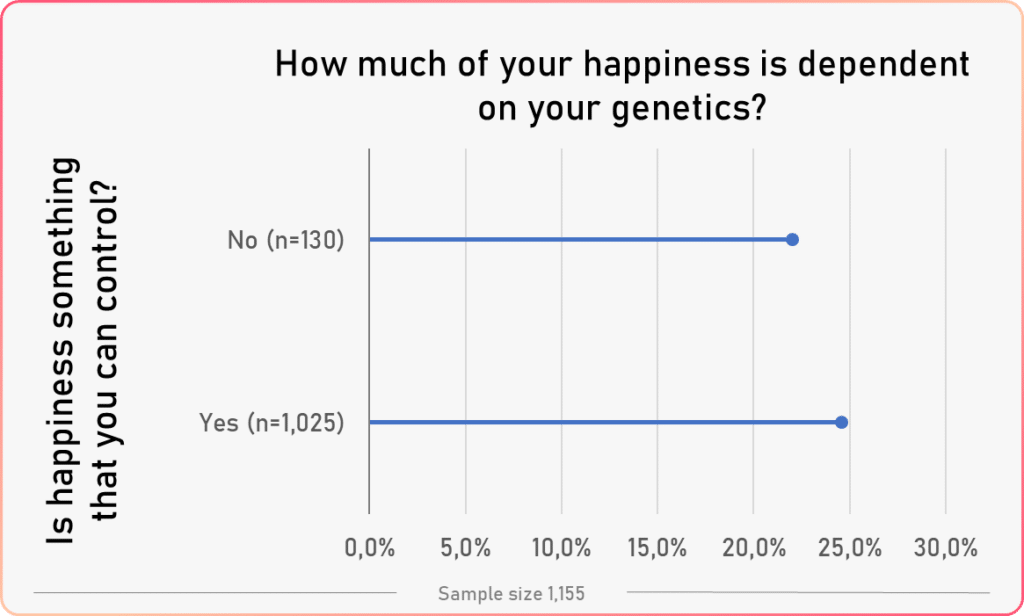
Knowing that our genetics are completely out of our control, these results can be called counterintuitive.
People who think happiness is controllable think that their happiness is 24.6% dependent on our genetics, whereas people who don’t think happiness is controllable answered that 22.0% of happiness is genetical.
This difference of 2.6% is too insignificant to draw conclusions from this data.
Gender
In general, female respondents believed on average that a bigger part of their happiness is genetical.
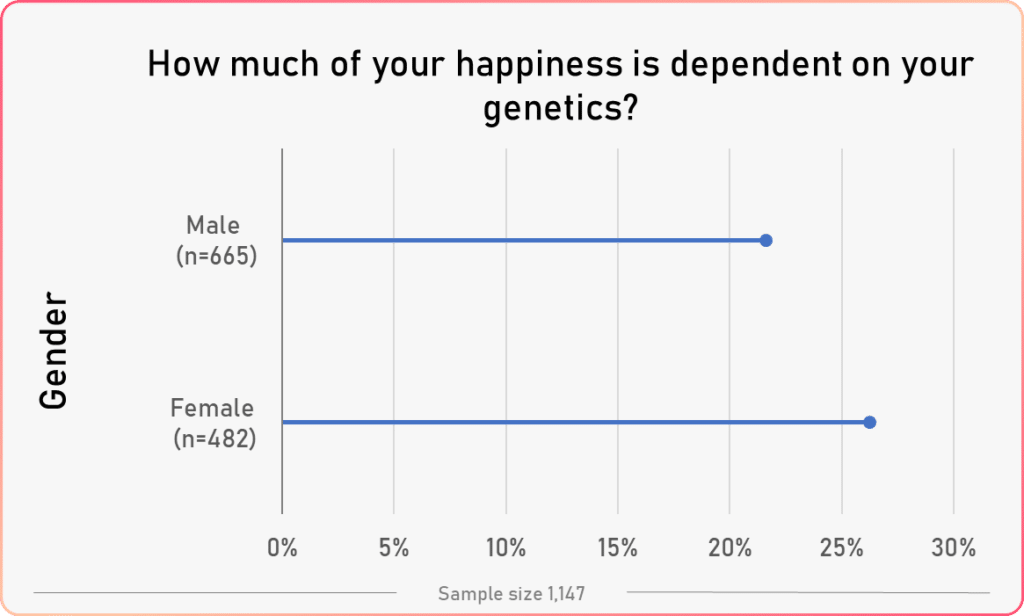
The difference between men and women is 4.6% (21.6% for men vs 26.3% for women).
Based on these percentages, it is implied that women believe that their happiness is 21% more genetical than men.
Some studies have found that women are more prone to swings in mood, caused by hormonal swings. This could be a cause for this difference between male and female respondents.
Age
The amount of our happiness that we think is genetical follows an interesting curve as we age.
This is shown in the chart below:
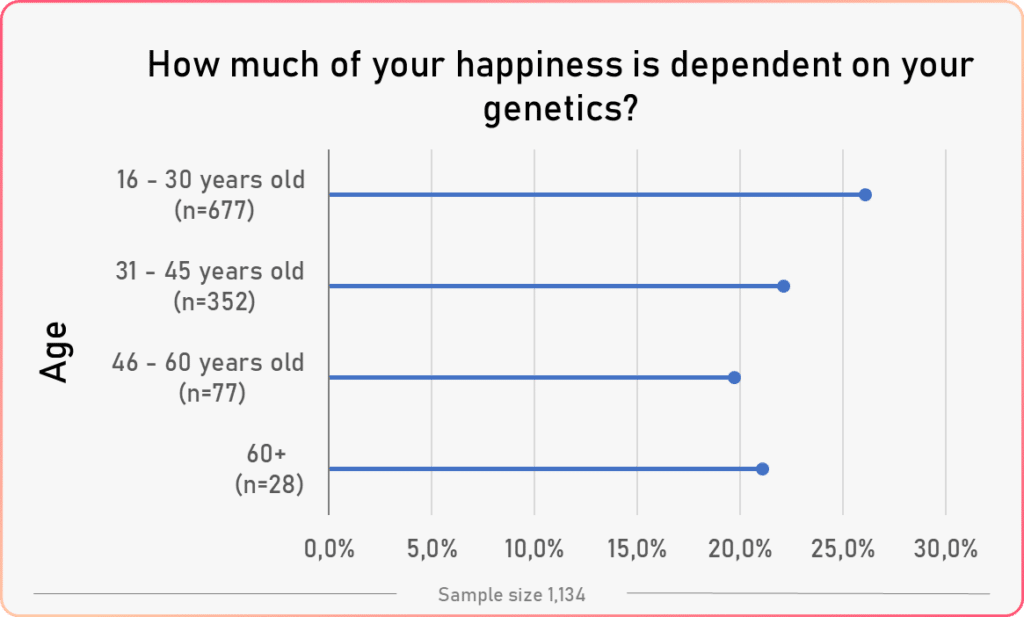
The average percentages per age group are as follows:
- 16 – 30 years old: 26.1%
- 31 – 45 years old: 22.1%
- 45 – 60 years old: 19.7%
- 60+ years old: 21.1%
The percentage of our happiness that is believed to be determined by genetics decreases as we age, and reaches a dip when we’re between 45 and 60 years old. From there, the influence of genetics on our happiness increases again.
There is a lot of interesting research on the effect of our age on genetics. This study claims that our genetics can change up to 20% as we age. In addition, this study supports that a part of our DNA can change over time.
This is an interesting comparison, because the results of our study imply that our belief of our genetics – and its effect on our happiness – can change as well.
Education
Our level of education is not something that can influence our genetics.
Still, we wanted to see whether or not the educational background influenced the happiness that our respondents believed to be determined by their genetics.
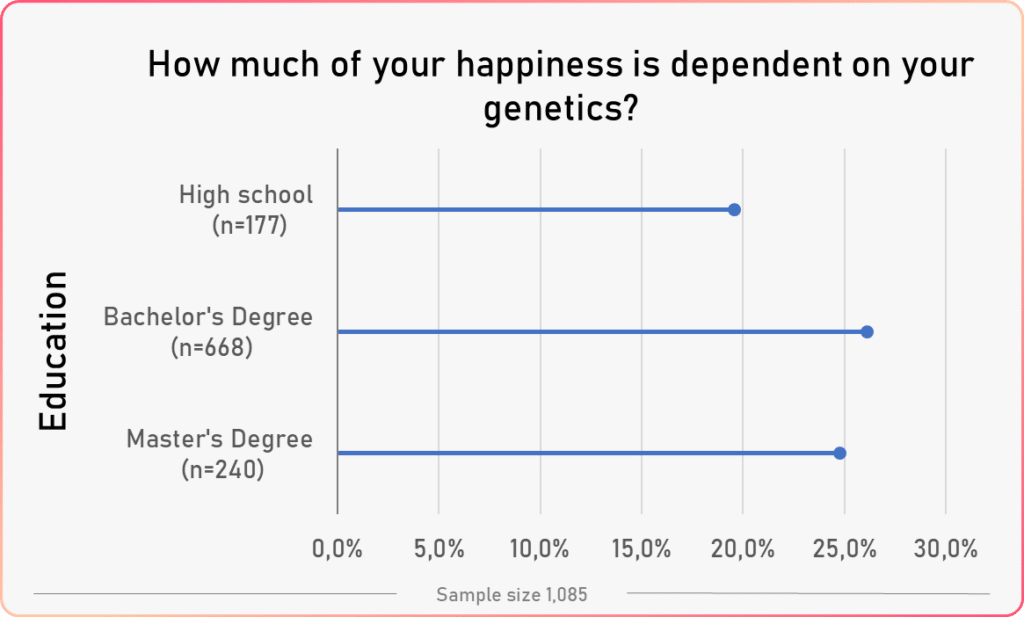
We surveyed the respondents about their educational background:
- What is the highest degree or level of education you have completed?
Similar to our answers about our ability to control happiness, it seems that the results are too insignificant to draw any conclusions from this data.
Marriage
Interestingly, those who are married tend to believe that a bigger part of their happiness is genetical, according to the respondents.
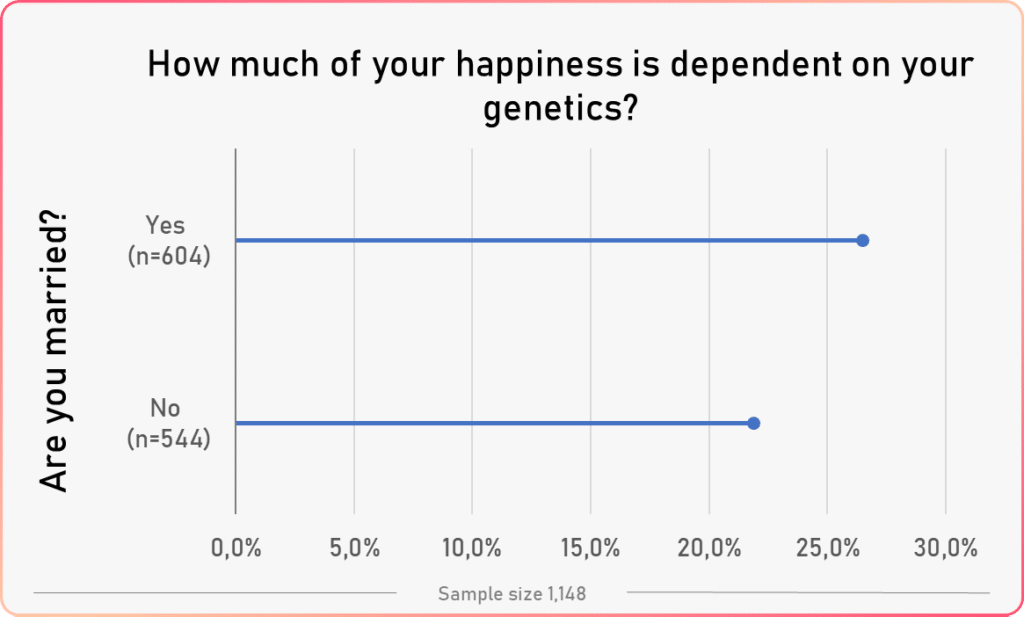
Married people think that 26.5% of their happiness is determined by genetics, while unmarried people indicate that this percentage is 21.9%.
Commentary from the team:

Hugo Huijer, Founder of Tracking Happiness
If this proves anything at all, it’s that the answers of our respondents need to be interpreted cautiously. Being married or not simply cannot influence our actual genetics.
Just because the answers of our respondents show a notable difference only means that our marital status can influence our belief of how much happiness is genetical.
In addition, this is a good example of a correlation that doesn’t prove causation. It’s more likely that married people are happier, and as a result, are more inclined to attribute a bigger part of their happiness to their genetics.
Employment status
Respondents were asked the following question:
What is your current employment status?
They were able to choose out of the following answers:
- Employed full-time (n=836)
- Employed part-time (n=138)
- Not employed (n=42)
- Retired (n=17)
- Seeking opportunities (n=48)
- Student (n=52)
- Prefer not to say (n=22)

Again, it is impossible for our employment status to change our genetics, similar to our marital status and educational background.
Children
Having children is another one of the variables that can’t possibly have an actual effect on our genetics. Still, respondents were asked about the amount of children they have conceived.
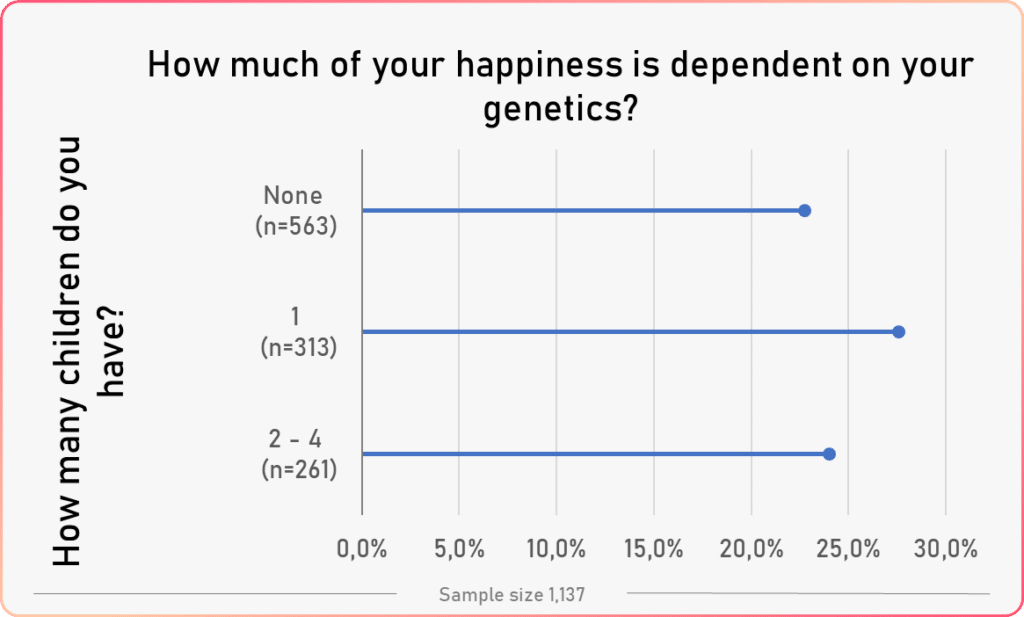
Existing study on genetics vs happiness
There is a part of our happiness that is determined by our DNA. We can’t change this.
Some people are simply more prone to be happy than others. This was studied by examining identical twins in 1996, where 44% to 52% of the variation in our well-being can be explained by genetic variations.
Methodology
If you’re looking for more information on how the study was performed, this article provides an overall introduction to this study. It also includes links to other result articles that are relevant to this study.
Want to know more details? Like who was surveyed, what are the demographics of the respondents, and how the study was performed? Here is a link to a document that explains it all (opens in a new window):
Closing words
Roughly 25% of our happiness is believed to be determined by our genetics.
Does this study shed light on what type of people are inclined to think that happiness is genetical? What do you think of these results? Let us know in the comments below!
Tracking Happiness, 2020. How Much Of Our Happiness Is Genetic? (New Study Results!). [online] Tracking Happiness. Available at: https://www.trackinghappiness.com/how-much-happiness-is-genetic/

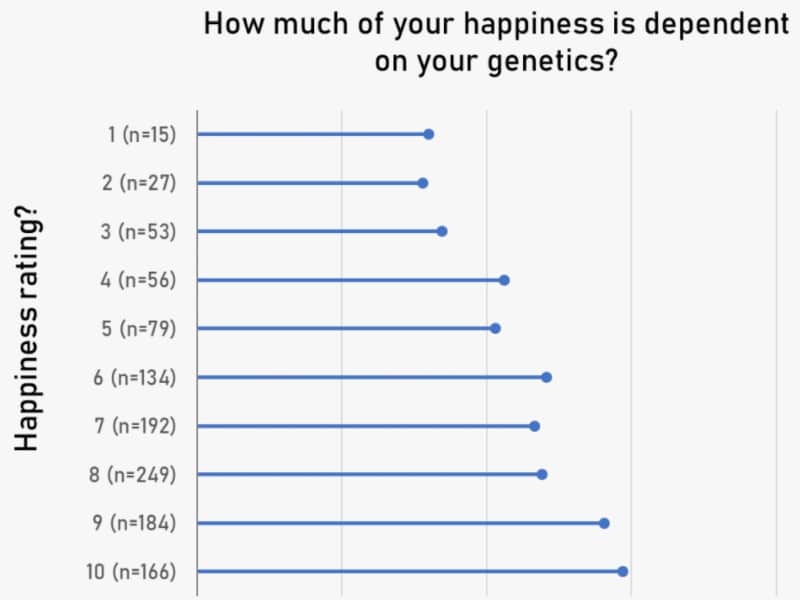
Commentary from the team:
Hugo Huijer, Founder of Tracking Happiness
What does this data imply? That is a difficult question.
On one hand, it seems that people who believe a bigger part of their happiness is genetic are also more inclined to actually be happier. You could say that if more of your happiness is determined by your genetics, the happier you actually are. In a way, this makes sense, because that would leave less of our happiness dependent on negative external circumstances.
But on the other hand, this could also mean that happy people are more inclined to take credit for their happiness by explaining “it is who I am”, instead of giving credit to their positive circumstances for example.
To be fair, this data does not imply anything at all, since a correlation between two variables does not prove causation.